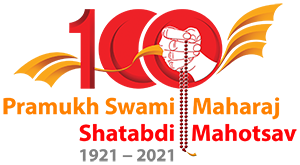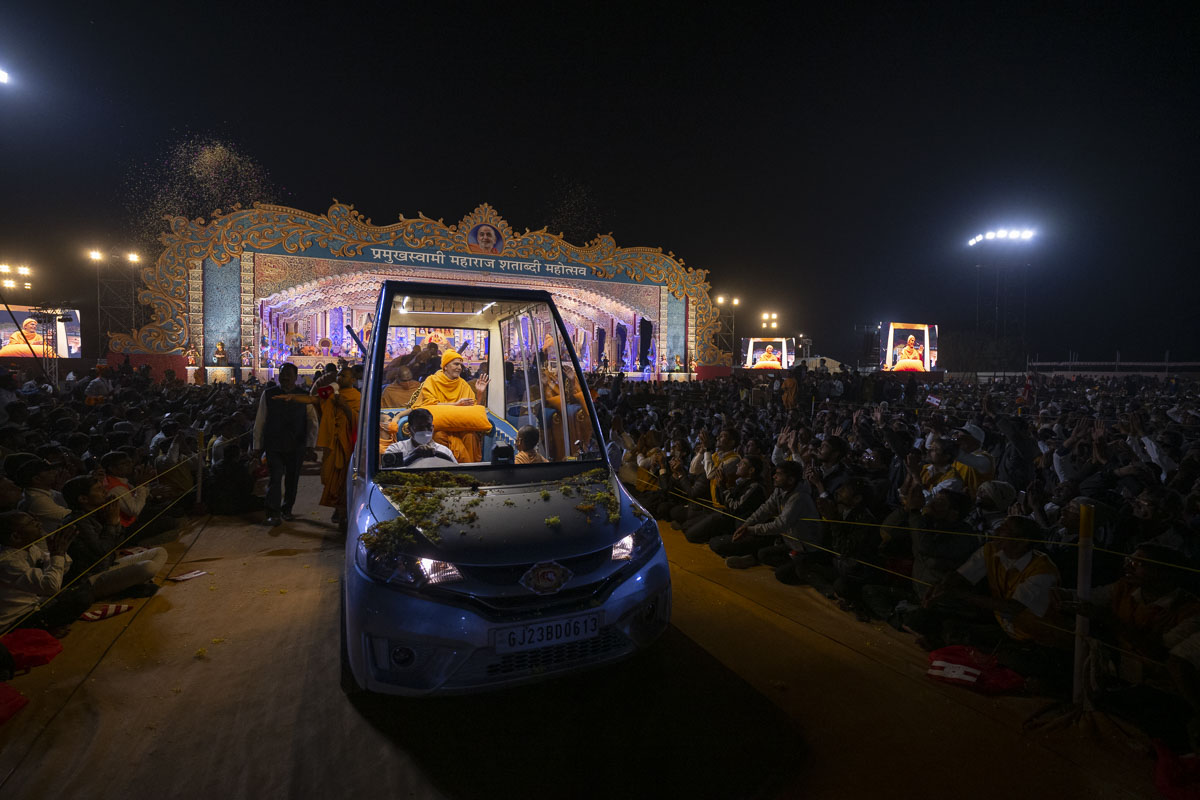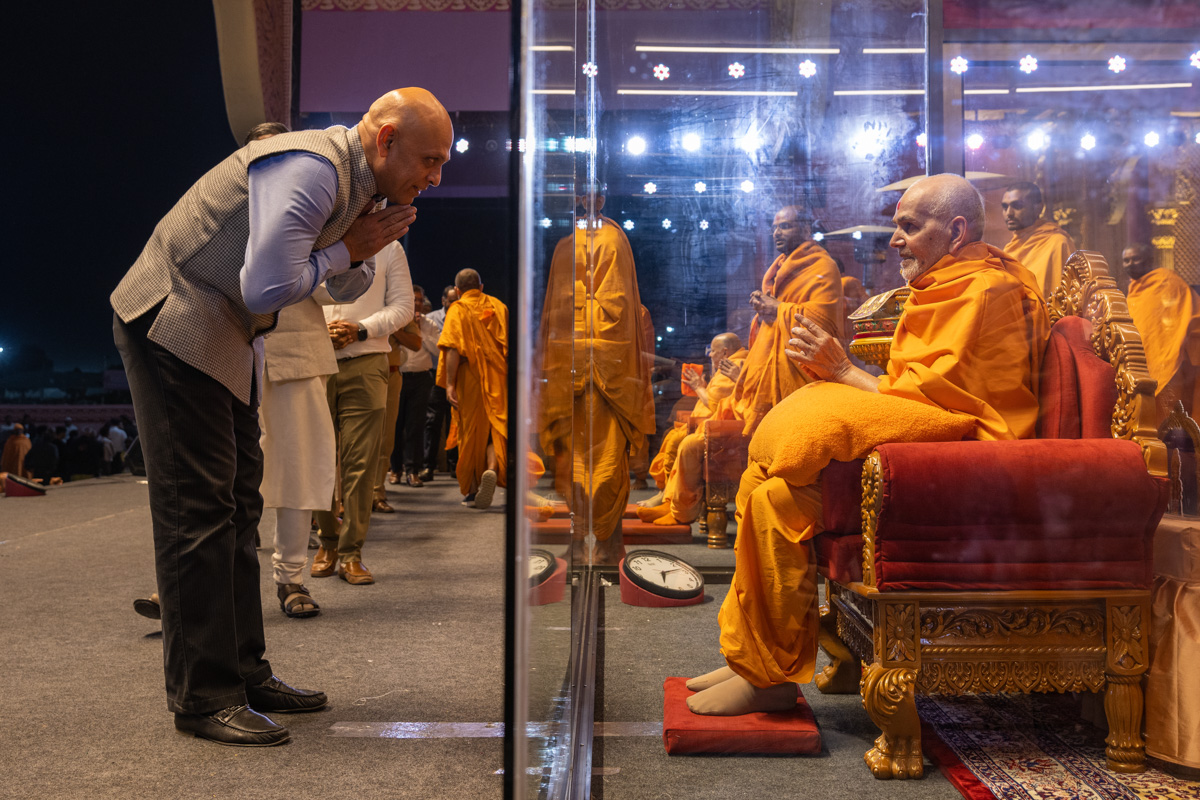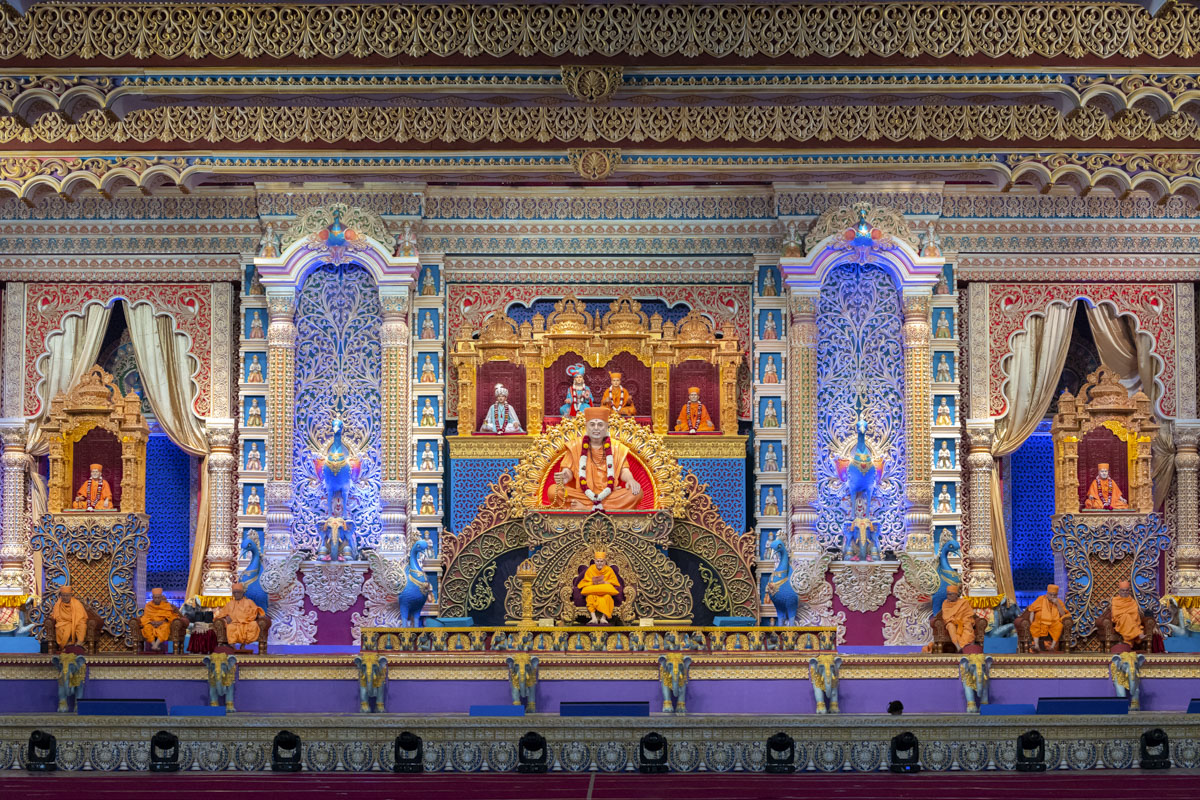Women Empowerment and Hindu Socio-Spiritual Traditions
5 Jan. 2023, Thursday, Ahmedabad, India

On the occasion of Pramukh Swami Maharaj centenary celebrations, an international conference was organized on “Women Empowerment and Hindu Socio-Spiritual Traditions” in Ahmedabad. The conference was organized by the BAPS Swaminarayan Research Institute, New Delhi, in collaboration with Shreemati Nathibai Damodar Thackersey (S.N.D.T.) Women’s University, Mumbai. The conference was attended by scholars and students from around the world—including universities in India, Australia, the United States of America, and the United Kingdom. They presented original research and engaged in meaningful dialogue on women’s rights, representation, and empowerment.
The Inaugural Session
The conference commenced with the performance of the deep pragatya by Dr. Jayanti Ravi, the Secretary of the Auroville Foundation in Tamil Nadu and a former IAS officer of Gujarat, Dr. Neerja Gupta, the Vice Chancellor at the Sanchi University of Buddhist-Indic Studies, Dr. Ami Upadhyay, the Vice-Chancellor at Dr. Babasaheb Ambedkar Open University, Ahmedabad, Prof. Hemixa Rao, the former Vice-chancellor of Hemchandracharya North Gujarat University in Patan, Dr. Ruby Ojha, the Pro Vice-chancellor at S.N.D.T. Women’s University in Mumbai, Dr. Hanna Kim, Chair of the Anthropology Department at Adelphi University in New York, Shri Vanitha Datla, a Vice Chairperson & Managing Director at Elico Ltd. Hyderabad, and Dr. Neeta Shah, the Director of BAPS Women’s Swaminarayan School in Randesan and the Overseer of BAPS women’s activities.
In her welcome address, Dr. Ruby Ojha, the Pro Vice-chancellor at S.N.D.T. Women’s University in Mumbai, elaborated on the presumptions that have raised contemporary concerns about gender inequity. She mentioned that it contrasts the feminine divine present in ancient Indian tradition. She suggested that “contemporary gender problems need to be addressed by reviving those lost values inherent within Indic religious systems. Men and women are not competitors.”
Thereafter, a special guest address was delivered by Dr. Neerja Gupta, the Vice Chancellor at the Sanchi University of Buddhist-Indic Studies. She explored the practices and beliefs within Indian religious traditions that provide feminist ideals and contrasted them with other traditions. She explained, “We need to rethink our own tradition to find gender-equal ideas. Anything social must be guided by the spiritual. According to Lord Krishna’s message in the Gita, compassion is the root of dharma.”
In her keynote address, Dr. Hanna Kim, the Chair of the Anthropology Department at Adelphi University in New York, presented on the role of the BAPS Yuvati Talim Kendra (Women’s Training Center) in empowering young women to attain “greater contentment and autonomy in life by cultivating techniques found in the Swaminarayan toolkit for navigating everyday lives.” She elaborated how “the BAPS Yuvati Talim Kendra provided a platform to give voice to women who could not previously speak in public.” By comparing the famous writer Virginia Woolf’s and Pramukh Swami Maharaj’s worlds, she stated: “Pramukh Swami Maharaj was ahead of his times in valuing human capacity regardless of caste, class, and gender.” Then, through a case study, she presented the “individual attention and care” provided to young women by the teachers at the training center.
Dr. Jayanti Ravi, the Secretary of the Auroville Foundation in Tamil Nadu and a former IAS officer of Gujarat, presented the inaugural address and cited the examples of Andal and Meerabai as exemplary women figures of bhakti traditions. She further highlighted the inherent power of Indian devotional traditions and spirituality to induce inward transformation. She applauded BAPS for the selfless devotion, dedication, and commitment of the female and male volunteers at the Pramukh Swami Maharaj Nagar. She concluded by asking the audience to immerse themselves in a devotional song by Mirabai.
Thereafter, Dr. Neeta Shah, the Director of BAPS Women’s Swaminarayan School in Randesan and the Overseer of BAPS women’s activities, showcased the progression of women’s activities since the time of Bhagwan Swaminarayan. She also highlighted the role of women volunteers at Pramukh Swami Maharaj Nagar, who have utilized their specialist skill sets to effectively and efficiently engage in their volunteer roles. She further urged the scholars to use this platform to “provide feedback and review so that BAPS can continue to empower women in future projects.”
The Plenary Session
Dr. Kalpesh Bhatt, an Assistant Professor in Classics, Philosophy, and Religion at the University of Mary-Washington, chaired the proceeding Plenary Session. Citing ethnographic narratives of women devotees, he argued how Pramukh Swami Maharaj took “a meaningful interest in the lives and challenges faced by women.”
Presenting statistical data, Dr. Vanitha Datla, a Vice Chairperson & Managing Director at Elico Ltd. Hyderabad, recognized the decline of India’s ranking in the Global Gender Gap Index. She highlighted how to “promote women’s participation not only in political economy” but also in “economic decision-making power [which] must be granted to women at an individual level.” She elaborated on the significance of providing women “wings to fly, platforms to blossom, and infrastructure facilities to contribute.” She urged the audience “to think about women empowerment for not just one day of the year but every day.” She drew out a roadmap for such empowerment that focused on developing six leadership qualities for women.
Ms. Purnima Dave, a Retired Reader and the Head of the Department of Philosophy at Sathaye
College in Mumbai, then underscored the importance of women seers in ancient India and their contributions to Indian philosophy, debate, and dialogue. She recalled Pramukh Swami Maharaj’s “encouragement for a tradition of all-exclusive women’s conferences in BAPS and his promotion of publications from women authors.” She also touched upon Bhagwan Swaminarayan’s encouragement for character transformation, respect for the Dalit community, and women empowerment.
Thereafter, Dr. Ranjana Harish, a Former Professor and the Head of the English Department at Gujarat University in Ahmedabad, narrated the story of Bahinabai, a woman devotee of Varkari Sant Tukaram. She recounted how “her (Bahinabai’s) husband became a disciple after recognizing her devotional and spiritual potential.” Dr. Harish further showed how Bhagwan Swaminarayan promoted women’s rights to perform bhakti, attain liberation, and “be recognized as persons worthy of human dignity.” She further explained how Pramukh Swami Maharaj’s inspirational letter “supported her during a stressful time in her own life.”
The Presentation Sessions
Two parallel paper presentation sessions then followed the plenary session. One of the sessions was chaired by Dr. Rucha Brahmbhatt, the Head of the Department of English at Samarpan Arts and Commerce College in Gandhinagar. The first presentation was given by Dr. Daksha Dave, a Professor at M.M.P. Shah Women’s College of Arts and Commerce. She focused on the role of Pramukh Swami Maharaj’s earthquake relief activities, which included multiple initiatives oriented towards providing women employment and financial independence. Thereafter, Dr. Hetal Barot, an Associate Professor at S.N.D.T. Women’s University, highlighted the history and representation of women in Gujarati literature, focusing mainly on the work of Javerchand Meghani. Then, Jitendra Ahirkar, a Principal at B. L. Amlani College of Commerce and Economics, suggested making gender-empowering ideas expressed in Indian scriptures a reality in contemporary society. Dr. Darshana Oza, the Head of the Gujarati Department at S.N.D.T. Women’s University, then showcased the socio-spiritual empowerment of women by presenting case studies of female devotees, including Loyan, Toral, Liralbai, and Gangasati. Thereafter, Shri Maharshi Vyas, a Doctoral candidate at the University of California, Santa Barbara, presented a case study of an Adivasi woman named Hiraben. He demonstrated how women navigate issues through religious practices and the use of safe spaces like those provided by the BAPS women’s wing. Dr. Manjula Chheda, an Associate Professor at Shrimati P. N. Doshi Women’s College, Mumbai, then brought forth the exemplary work done by BAPS women’s spiritual conferences and Adhiveshans. She emphasized the need to delve inward and realize one’s self. Dr. Harsha Merchant, the Principal at Ayesha Bai Women’s College of Education, Mumbai, presented the role of “education and literacy in creating awareness and admiration towards women and their dignity.” She also emphasized the significance of health and nutrition awareness amongst women. Dr. Abhay Doshi, an Associate Professor and the Head of the Gujarati Department at the University of Mumbai, then presented a case study of two exemplary princesses of Karnataka, who exemplified the contributions of women in social and state affairs. Shri Priti Shah, a Retired Professor at M. P. Shah Junior College, Mumbai, thereafter, showcased the exemplary role of Mirabai, Gangasati, Panbai, and others in bringing about social and spiritual revolutions. Prof Rucha Brahmabhatt, the Head of the Department of English at Samarpan Arts and Commerce College in Gandhinagar, concluded the session with her presentation on “how women devotees within the BAPS use media technologies, like global webinars, to connect with other women around the world and as a tool of empowerment.”
Prof. Chandrika Raval, a Retired Professor of the Department of Sociology at Gujarat University, chaired the second parallel session. Prof. Rajasi Clerk, the Director of the School of Social Sciences at Gujarat University, commenced the session by tracing developments of legislation on crimes against women. Dr. Hina Gajjar, an Associate Professor at N. S. Patel Arts College, Anand, then presented how the ancient practices of women empowerment described within Indian scriptures continue to be implemented through socio-spiritual organizations like BAPS. Thereafter, Dr. Jaysinh Zala, the Head of Social Sciences at Bhakta Kavi Narsinha Mehta University in Junagadh, examined the contribution of the Swaminarayan Sampraday and Pramukh Swami Maharaj, in particular, toward the well-being of women. Dr. Purvi Oza, an Associate Professor at the Sarkari Vinayan College in Gandhinagar, then presented on the reflective aspects of Mirabai’s and Janabai’s poetry. Dr. Mahesh Bhatt, the Head of the Department of English at Government Science College, Idar, showcased the saints of the Swaminarayan Sampraday and BAPS. He highlighted their continued support for empowering women. Dr. Bhakti Mamtora, the Assistant Professor of Religious Studies at the College of Wooster, then underscored the significance of the living guru in the transmission of Indian culture and the formation of Hindu diasporic communities abroad in the context of BAPS women. Thereafter, Shri Meera Trivedi, a student at Shree Somnath Sanskrit University, emphasized the need to explore feminine and performative genres in bhakti literature. She also portrayed the role of Sahajanand Swami in empowering female devotees like Jivubai, Ladubai, and Kushalkuvarbai to prominence. Shri Nirali Patel, a student at Shree Somnath Sanskrit University, then examined “how the Swaminarayan female bhakti can forge a bond that transcends the spatiotemporal plane.”
The Concluding Session
In the final session, Dr. Hemixa Rao, the former Vice-chancellor of Hemchandracharya North Gujarat University, Patan, summarized various presentations at the conference and emphasized “the role of both men and women in furthering women’s empowerment.” Stressing the need “to remove the inferiority complex and instill pride and confidence in women,” she highlighted Pramukh Swami Maharaj’s role in fostering a sense of “ideological independence” in women. In conclusion, Dr. Jyotindra Dave, the Director of BAPS Research Institute in Delhi, thanked all volunteers—specifically Prof. Jayesh Mandanka, Prof. Anand Acharya, Dr. Neeta Shah, and Shri Meenaben Patel—for their tireless effort in organizing the conference. Upon emphasizing the influential role that his mother and other women in his family played in his life, he thanked all the scholars who attended and contributed to the meaningful discussions at the conference.































